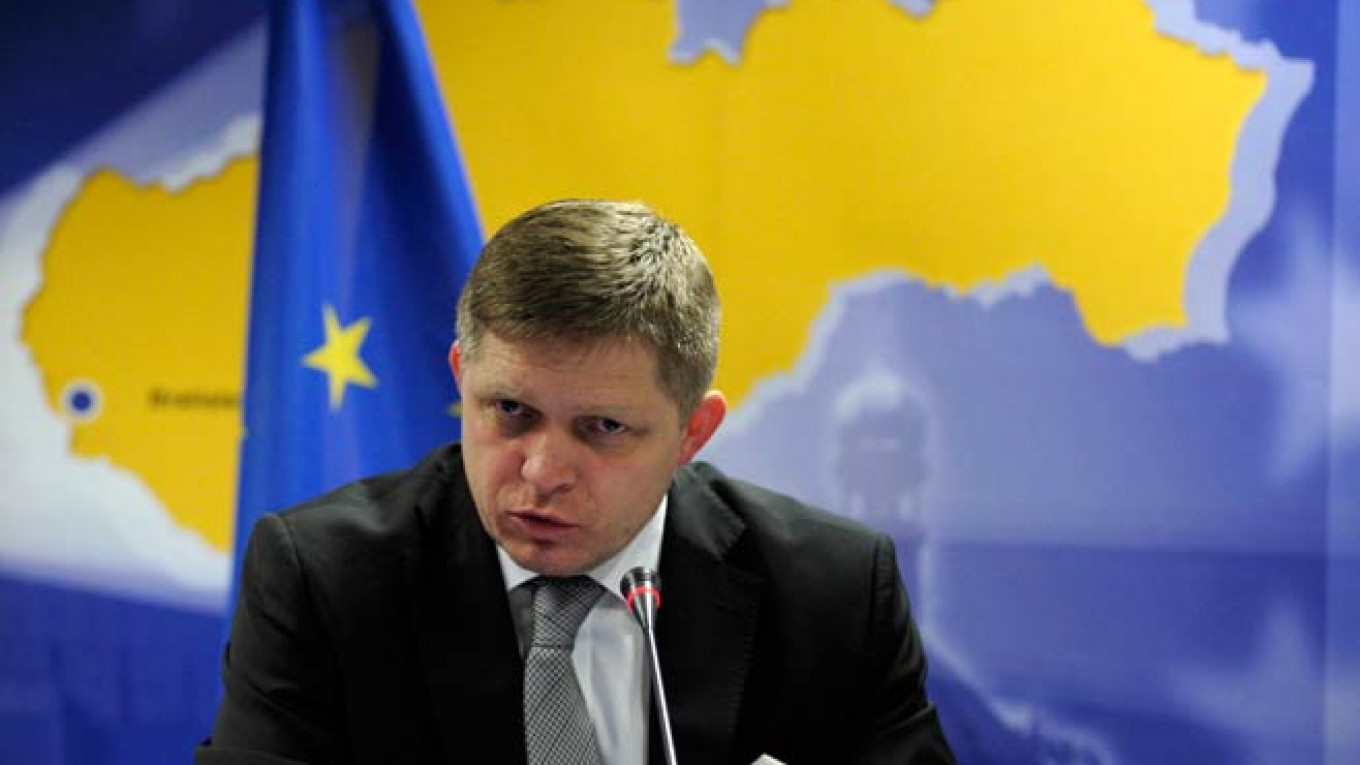PRAGUE/BUDAPEST — Slovak Prime Minister Robert Fico called for talks with Ukraine, Russia and the European Commission to ensure his country can reverse gas flows to Kiev without violating existing contracts, while Hungary said it could do so at once.
Financially strapped Ukraine has been anxious to obtain affordable natural gas since Russia tore up a discount negotiated under Kiev's former President Viktor Yanukovych and this month raised the price it must pay for gas from Russian supplier Gazprom by 80 percent.
Relations between Ukraine and Russia have been in crisis since the pro-Russian Yanukovych was ousted by protesters seeking closer ties with Europe, prompting Russia to seize and annex Ukraine's Russian-majority Crimea region.
Fico told reporters Thursday he supported projects to send gas to Ukraine but needed to ensure Slovakia gets paid and avoids violating contracts with Gazprom.
"The optimal solution would be a meeting of representatives of Ukraine, Slovakia, Russia and the European Commission, to discuss conditions under which Slovakia would be involved in reverse flow of gas," Fico told a news conference, according to the government's website.
Slovakia is the EU's best-placed member nation to pump gas to neighbor Ukraine should Russia reduce or shut off supplies from the four pipelines that feed Slovakia via Ukraine.
But reversing flows along any of these pipelines would breach terms of contracts with Gazprom, a spokesman for Slovak pipeline operator Eustream said this week.
However, in Budapest, Foreign Minister Janos Martonyi said on Thursday Hungary was ready to start shipping natural gas to neighboring Ukraine "at any time" and the technical conditions for starting the reverse pipeline flows are in place.
Martonyi, who met Ukrainian Deputy Minister for Foreign Affairs Danilo Lubkivsky in Budapest, said that Budapest firmly backed Ukraine's territorial unity and believed the annexation of Crimea by Russia was illegitimate, Hungarian national news agency MTI reported.
Hungary is a smaller potential gas source than Slovakia but its pipeline network operator FGSZ Zrt said earlier on Thursday in reply to e-mailed questions that Hungary could ship 16.8 million cubic meters, or mcm, of gas per day to Ukraine.
"The technical and legal conditions for shipping … gas into Ukraine have been in place in Hungary since March 2013," FGSZ said.
Russia is Europe's biggest gas supplier, providing about a third of continental demand, which at current daily flows of 270 mcm is worth almost $100 million a day. About 40 percent of Russian gas is currently exported through Ukraine and some of it further through Slovakia.
Fico said the Slovak government was investigating whether there were technical solutions to reverse flows without infringing contracts or incurring sanctions.
One possibility could be to allow flow reversal along a pipeline from Vojany to Uzhorod in Ukraine which could supply 9 billion cubic meters of gas per year, he said.
He added that his European Union member nation also needed to make sure it gets paid for taking such steps and for any gas shipments to Ukraine, and needed guarantees from a third party such as the EU.
"We want to help but we do not want the idea take root that nobody will pay for such services," Fico said.
Ukraine missed a deadline this week to pay Gazprom $2.2 billion for gas it has received.
Fico said he saw a risk in low levels of gas reserves in storage in Ukraine which could affect its ability to ship gas to Europe. He said an extra $5 billion worth of gas was needed to be added to Ukrainian storage sites.
A Message from The Moscow Times:
Dear readers,
We are facing unprecedented challenges. Russia's Prosecutor General's Office has designated The Moscow Times as an "undesirable" organization, criminalizing our work and putting our staff at risk of prosecution. This follows our earlier unjust labeling as a "foreign agent."
These actions are direct attempts to silence independent journalism in Russia. The authorities claim our work "discredits the decisions of the Russian leadership." We see things differently: we strive to provide accurate, unbiased reporting on Russia.
We, the journalists of The Moscow Times, refuse to be silenced. But to continue our work, we need your help.
Your support, no matter how small, makes a world of difference. If you can, please support us monthly starting from just $2. It's quick to set up, and every contribution makes a significant impact.
By supporting The Moscow Times, you're defending open, independent journalism in the face of repression. Thank you for standing with us.
Remind me later.






